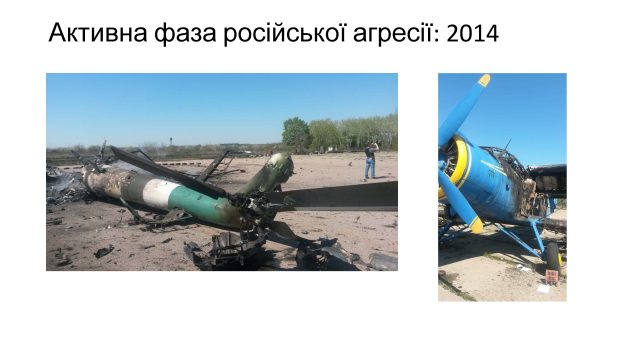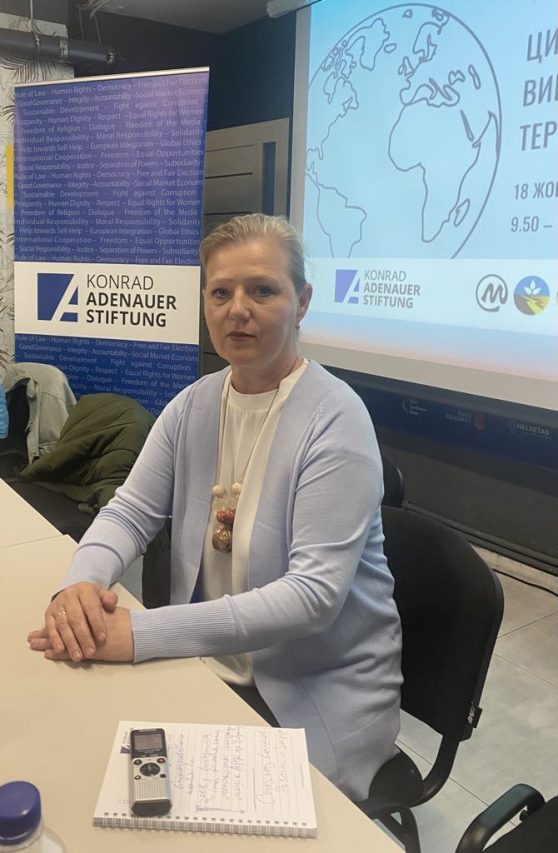What challenges did specialists face documenting Russian war crimes before 2022? What changed after the large-scale invasion?
by Dr. Yulia Laputina, Psychology Ph.D. and Major General serving as a Special Assignments Officer ot the Office of the Head of the Security Service of Ukraine
October 18, 2024, the VII Kharkiv Security Forum “Civilian Ukrainians: Challenges and Resilience in the Conditions of Terrorist War” was held in Kharkiv. The forum was organized by the Maidan Monitoring Information Center and the Konrad Adenauer Foundation with the support of the Humanitarian Coordination Center.
The forum expert speeches are published here.
Society was not ready to face the fact that Russia is the enemy
I contend that Russia’s aggression, initially covert, has persisted since Ukraine gained independence. Counterintelligence efforts documented numerous instances. Regrettably, for the entirety of Ukraine’s independence, its political leaders and society at large were unprepared for the reality of Russia as a constant adversary.
In 1994, during the Security Service of Ukraine’s (SSU) Crimean operation against separatism, I first directly experienced this. It was clear then, with our special forces facing a larger contingent of Russian Federation Black Sea Fleet special forces in Sevastopol. However, Russia had a more liberal government at the time, and some within our leadership, like Yevhen Marchuk, recognized the danger. His skillful actions were crucial in stopping the Crimean separatist attempt. Despite this, Russia persisted with subsequent actions like the cheese wars, milk wars, and the Tuzla Island dispute.
The secession of Crimea was already a threat in 2008
In 2008, our counterintelligence group conducted a significant sociological study in Crimea, collaborating with a research center. This study confirmed and analyzed existing operational intelligence. Notably, at that time, we operated independently of the Security Service of Ukraine in Crimea, as we had already identified Russian influence agents within their ranks. Unfortunately, the lack of extraterritoriality prevented us from transferring and replacing personnel from other regions, which would have been a necessary measure given the circumstances. These were the operational realities we faced.
Our comparative analysis of operational sociological data initially highlighted the threat of Crimea’s secession, a conclusion that subsequently proved accurate. Consequently, we formulated a plan aimed at the mental integration of the Crimean population into the Ukrainian information space. Despite residing within Ukrainian territory, the population was subjected to both acoustic and semantic forms of psychological pressure.
Unfortunately, later the government changed, Yanukovych came. It was very difficult for us to work, because we were removed from making management decisions. And one of the conditions of the secret Kharkiv agreements was to withdraw all counterintelligence officers who worked in Russia from the Security Service of Ukraine.
2014. Kramatorsk. Beginning of the Anti-terrorist Operation
But let’s go back to 2014. On April 13, an anti-terrorist operation was announced. On the 14th, we took off on an Il-76 with a group of service employees in the amount of about 120 people, including investigative units. From Kharkiv, we moved by helicopter to the Kramatorsk airfield. We didn’t yet know that this was an occupied city. We know that there have already been situations in Luhansk, our employees were present there. And we arrived there, they placed us, and they gave us the appropriate tasks.
Unfortunately, after the first helicopter explosion, the command at the time urgently flew to Kyiv. And we had no one left, except for one of the generals of the Armed Forces of Ukraine, to whom we did not submit. And so our employees, my colleagues from Alpha (I also worked there), went out for reconnaissance. They made fire cards and said: “Remove the helicopters from the civilian part of the airfield, because they are under fire.” No one did this. As a result, this terrible story happened: the helicopter burned down in 15 minutes. But the heroic pilot turned it away from the city. He jumped out, was injured. But 58 missiles flew not to Kramatorsk, not to the city, but to the fields.

Who can document it? We are in an occupied city, there are no investigators. The nearest settlement where there are investigators is Mariupol, 250 km away. So I just approach the investigators from our main investigative department and say: “Guys, at least do an inspection of the scene. There is already destruction here. And this is private property, by the way.” They were doing something there.
And in Kyiv, no one knows that it is a war
I called the service management, my specialized deputy head. I said: “Do something, because there is a war here.” And no one in Kyiv knows that this is actually a war.
No one will tell this, because it is a very curious story. The head of the team, the investigators, lived on this plane. All their documents were burned there. And when they were given a command, they began to inspect the scene of the incident. Then it turns out that someone has to sign, some official. Who is it? So that you understand: I saw this sheet, I did not film it, unfortunately. But there was a signature “Filin”, someone’s call sign. Where should I put it?
But we pressed on, this documentation was prepared, verified. And it formed the basis of the first criminal proceedings on anti-terrorist operations. On the basis of which all subsequent cases of Russian aggression were then added. They were added for many years. Because no one had the political will to call it a war. This was also very important at that time. And thus a lot of evidence was lost.
Then we were in Dovhenke, in the military camp, there were also investigators there. We carried out counterintelligence operations, we found caches. When you find a person, then there is already a suspect, you can incriminate him with something there. And with this person, in fact, something further needs to be done: either suspicion, or he is guilty, or innocent. You bring evidence, you film MANPADS 20. I don’t remember how many tons of these shells were found there by my group alone.
Where did the evidence go?
We brought stories that were very important in the information war. I was in the Svyatogorsk Lavra when it was still an occupied place. I did reconnaissance and documented the propaganda that was being done there. And I personally brought all this to the headquarters and gave it to where it was needed. Where did it go? I still don’t know.
And I was at events in Slavyansk to counter hybrid threats and spoke there many times. I have many partners, friends, and Ukrainian activists there. And they ask me: “Are you investigating the crimes of the Moscow Patriarchate? Why is this priest still serving those who consecrated Girkin?” We must admit that for many years we did not have the political will to do this.
Now we know who the enemy is
Now we know who the enemy is. And the Security Service of Ukraine has significantly increased its capabilities and capabilities over the years since the beginning of the large-scale invasion. Many indictments have been announced, against the military leaders of the Russian Federation, accomplices. Indictments have also been announced against collaborators. Before going here, we spoke with the leadership of the Main Investigation Department.
Where else have we advanced? We have advanced together with you in interaction with civil society. Now the Security Service is actively cooperating with documentarians from the public sector. And now I am still talking about Russia the aggressor, about Russia the enemy. And about the fact that this is an aggressive war. And I wish us all to make efforts so that not only are there proceedings under Article 437 of the Criminal Code of Ukraine, but that we have verdicts from international courts of various jurisdictions.
Because this is an existential war. And there is no turning back. If we don’t prove that this was a planned idea of war, specific actions of officials at different stages, different levels, and direct actions, then…
It is difficult to prove the idea of war
It is difficult to prove the idea of war: let’s consider Dugin’s doctrine, let’s consider all those preparatory actions that were carried out by Russian scientists. In order to be effective, we need to engage in enemy studies. Hundreds of institutes in the Russian Federation are working to improve their technologies of manipulation and influence on different spheres and different target audiences. Unfortunately, we do not have a systematic scientific base and we do not systematically engage in the studies.
This is my proposal, as a result of the forum, that we engage in enemy studies together with you.
Wars begin in people’s minds, first of all. And then they pour out in different forms – informational, military, economic and any other. Unfortunately, our enemy has been very successful in this. By the way, I agree that the war did not begin when Ukraine gained independence. This is a civilizational war, in fact. And the Russian empire existed because Ukraine was there.
The main thing is that you have the Russian World in your heart
I want to reflect on demography. One of the provisions of the Dugin’s Doctrine is that you need to change the demographic landscape of those territories that you want to influence. And it’s not just Ukraine. For example, 400 thousand Russians live in Berlin. They are also infected with this Russian World virus.
There is a man named Andrey Tkachev. He is a Russian Orthodox priest. He is from Lviv, but he graduated from the propaganda department of one of the Moscow universities. And then he came to Ukraine. He was the one who came up with the term “Maidanutye” (derogative for those who participated in Maidans). Then he fled to Russia.
He gives many sermons, there is such a channel as “East and West”. During one of the sermons, a girl, a student at the Bauman Moscow State Technical University, asks: “Please tell me, won’t it be a betrayal of Russia’s interests if I go abroad?” He says: “No, you already understand, the fact that you are leaving is nothing to worry about. The main thing is that you have the Russian World in your heart, and you know that if you leave and you like something there, then they live well there because you live badly.” That is, they all get fat in these European countries at the expense of the Russians. And such a person leaves calmly, he has not moved away from the Russian world anywhere. And there are 400,000 of them living in Berlin. And they are all voters.





